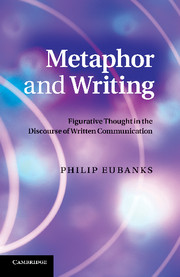Book contents
- Frontmatter
- Contents
- List of figures
- List of tables
- Acknowledgements
- Introduction
- 1 In search of the figurative rhetoric of writing
- 2 The double bind of writer and to write: Graded categories
- 3 Bind upon bind: The general-ability and the specific-expertise views of writing
- 4 Three licensing stories: The literate inscriber, the good writer, and the author writer
- 5 Writing as transcription, talk, and voice: A complex metonymy
- 6 The writing self: Conceptual blends, multiple selves
- 7 Writing to “get ideas across”: The role of the Conduit Metaphor
- 8 Codes and conversations: The other Conduit Metaphor
- 9 Metaphor and choice
- References
- Index
4 - Three licensing stories: The literate inscriber, the good writer, and the author writer
Published online by Cambridge University Press: 06 December 2010
- Frontmatter
- Contents
- List of figures
- List of tables
- Acknowledgements
- Introduction
- 1 In search of the figurative rhetoric of writing
- 2 The double bind of writer and to write: Graded categories
- 3 Bind upon bind: The general-ability and the specific-expertise views of writing
- 4 Three licensing stories: The literate inscriber, the good writer, and the author writer
- 5 Writing as transcription, talk, and voice: A complex metonymy
- 6 The writing self: Conceptual blends, multiple selves
- 7 Writing to “get ideas across”: The role of the Conduit Metaphor
- 8 Codes and conversations: The other Conduit Metaphor
- 9 Metaphor and choice
- References
- Index
Summary
Dysgraphia is a form of agraphia, the total inability to write. It is seen in children who are slow to develop writing skills and in adults who acquire the syndrome due to brain injury.
Diane Walton Cavey, Dysgraphia: Why Johnny Can't WriteAmerica's universities don't teach college kids how to write – at least, not how to write very well.
Stanley K. Ridgley, National Review OnlineWhile it is impossible to make a competent writer out of a bad writer, and while it is equally impossible to make a great writer out of a good one, it is possible, with lots of hard work, dedication, and timely help, to make a good writer out of a merely competent one.
Stephen King, On WritingIf we hope to understand our important metaphors and metonymies for writing, we also have to understand the stories that license these figures. As I found in my earlier research on metaphors in the discourse of trade and business, metaphors are integrally associated with stories that provide rhetorical support – that make a given metaphor seem either true or false. When I asked a series of focus-group participants to discuss whether or not certain metaphors seemed true to them (e.g., Trade Is War, Trade Is A Game, Markets Are Containers, Trade Is A Journey), they persistently justified their responses by supplying stories of how trade works or how the world works.
- Type
- Chapter
- Information
- Metaphor and WritingFigurative Thought in the Discourse of Written Communication, pp. 60 - 92Publisher: Cambridge University PressPrint publication year: 2010

